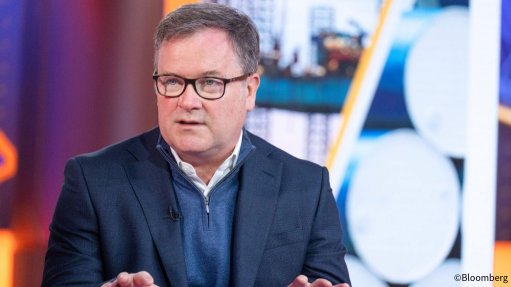Stakeholder relations key to Minerals Council’s new brand
In striving to become the pre-eminent policy advocacy in the mining industry, maintaining positive stakeholder engagement is key for Minerals Council South Africa, says public affairs and transformation senior executive Tebello Chabana.
He describes the Minerals Council as a focused advocacy entity with a complement of 70 “highly professional individuals at the top of their game”.
Minerals Council finance and administration senior executive Harry Groenewald adds that the May 2018 rebranding has resulted in an entity that has a performance-orientated outlook.
The Minerals Council’s primary stakeholders are its 78 members, which represent 90% of the mining industry. Its members also include the South African Diamond Producers Association, the Clay Brick Association of South Africa and the Aggregate and Sand Producers Association of South Africa.
Membership ranges from multinationals to junior companies, and Groenewald adds that the Minerals Council has become more representative, increasing its junior and emerging miners’ membership.
The board, which comprises 29 CEOs, is the highest decision-making body and has become more community- and outcomes-focused, introducing leadership forums for specific commodities, as well as the Northern Cape Mines Forum, and Junior & Emerging Miners Forum.
The forums’ agenda are driven by the CEOs who discuss strategies and issues affecting the industry.
All discussions are mindful of competition laws.These forums have enabled the creation of national growth strategies for specific commodities – the National Platinum Strategy and the National Coal Strategy released in February and last year respectively.
The Minerals Council adopted the Membership Compact – a compulsory code of ethical business conduct that members must adhere to and uphold – in 2015. The council uses it to screen new members and can suspend or terminate membership if the compact is breached.
The Minerals Council also completed detailed stakeholder mapping and analysis to understand “who our stakeholders are and who they influence”. Chabana adds that the vast majority of its interactions are on a regulatory and legislative basis, and stakeholders include the legislature, national and provincial executive, political parties, labour and trade unions, civil society organisations, communities, business organisations and the investment community.
He explains that the Minerals Council is open to mining companies that are not members, particularly on issues of vital importance such as safety. Nonmembers are able to access the insights gained from Mining Industry Occupational Safety and Health (MOSH), and participate in workshops hosted by the Minerals Council
.While the Minerals Council services its members, some issues are too important to exclude nonmembers, he notes. On issues that might be more “competitive”, Chabana comments that “it’s not as if we close the door . . . often, we’ll still try to engage and assist, whether through a conversation or sharing a document”
.“When we drive national issues . . . we do it for the industry . . . and nonmembers also benefit. You’ll find that, because of our approach, nonmembers want to join. They start to feel an obligation to actively participate, similarly to people who join organisations to be part of active citizenry,” adds Groenewald.
The Minerals Council represents the industry’s interests at legislative, executive, judicial and societal levels, including key engagement in employee relations and collective bargaining, and structuring skills development curricula, as well as coordinating well-researched responses to draft legislature on matters that affect mining.
Chabana notes that the Minerals Council has also become more proactive in engaging with the public. The
Minerals Council is striving to become a more effective and proactive communicator to improve stakeholder engagement to facilitate a more successful and equitable industry.
Comments
Press Office
Announcements
What's On
Subscribe to improve your user experience...
Option 1 (equivalent of R125 a month):
Receive a weekly copy of Creamer Media's Engineering News & Mining Weekly magazine
(print copy for those in South Africa and e-magazine for those outside of South Africa)
Receive daily email newsletters
Access to full search results
Access archive of magazine back copies
Access to Projects in Progress
Access to ONE Research Report of your choice in PDF format
Option 2 (equivalent of R375 a month):
All benefits from Option 1
PLUS
Access to Creamer Media's Research Channel Africa for ALL Research Reports, in PDF format, on various industrial and mining sectors
including Electricity; Water; Energy Transition; Hydrogen; Roads, Rail and Ports; Coal; Gold; Platinum; Battery Metals; etc.
Already a subscriber?
Forgotten your password?
Receive weekly copy of Creamer Media's Engineering News & Mining Weekly magazine (print copy for those in South Africa and e-magazine for those outside of South Africa)
➕
Recieve daily email newsletters
➕
Access to full search results
➕
Access archive of magazine back copies
➕
Access to Projects in Progress
➕
Access to ONE Research Report of your choice in PDF format
RESEARCH CHANNEL AFRICA
R4500 (equivalent of R375 a month)
SUBSCRIBEAll benefits from Option 1
➕
Access to Creamer Media's Research Channel Africa for ALL Research Reports on various industrial and mining sectors, in PDF format, including on:
Electricity
➕
Water
➕
Energy Transition
➕
Hydrogen
➕
Roads, Rail and Ports
➕
Coal
➕
Gold
➕
Platinum
➕
Battery Metals
➕
etc.
Receive all benefits from Option 1 or Option 2 delivered to numerous people at your company
➕
Multiple User names and Passwords for simultaneous log-ins
➕
Intranet integration access to all in your organisation


















